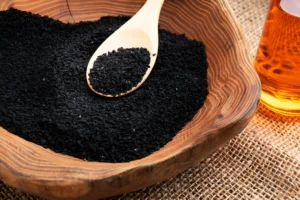
Acknowledging Asthma
Breathing becomes challenging when you have asthma because of inflammation and airway constriction. Numerous things, such as exercise, stress, allergies, weight issues and environmental toxins, might cause it. The first step to effectively treating asthma and locating supplemental treatments that can provide help is understanding the nature of the condition.
Symptoms and Signs of Asthma
Typical asthma symptoms include
- Breathlessness and wheezing
- Persistent cough, particularly in the early morning or at night
- Pain or tightness in the chest
- Difficulty breathing during physical activity
The intensity of asthma symptoms varies, and they frequently get worse during an asthma attack. For people with this illness, maintaining a high quality of life depends on effective care and preventative measures.
Black Seed Oil’s Powerful Effects on Asthma Management
Black cumin seed oil, extracted from the seeds of Nigella sativa, has been valued for its historical use in supporting respiratory health. This oil is increasingly recognized as black seed oil good for asthma due to its rich content of beneficial compounds, including thymoquinone. These compounds provide anti-inflammatory and antioxidant properties, which help to soothe irritated airways, reduce inflammation, and enhance lung function. Black seed oil to help asthma can be effectively integrated into an asthma management plan, offering individuals significant relief from asthma symptoms and a marked improvement in respiratory well-being.
Beneficial Compounds in Black Seed Oil to Help Asthma
Black seed oil has a number of advantageous substances that combine to help treat asthma. Together, these elements improve respiratory health in general and offer complete relief from asthma symptoms. Here’s a closer look at the main components of black seed oil that contribute to asthma management:
- Minerals and vitamins: Important vitamins and minerals found in black seed oil include zinc, vitamin C, and vitamin E. These nutrients have a major impact on respiratory system protection and immunological function enhancement. Antioxidants such as vitamin C and E have potent anti-inflammatory and protective properties for lung tissues. Zinc not only supports healthy immune system functioning but also helps regulate the frequency and severity of asthma attacks.
- Nigellone: This essential substance in black seed oil acts as a natural bronchodilator, relaxing and opening up the airways. It is helpful in controlling asthma because it enhances airflow and relieves breathing issues. Because nigellone counteracts airway constriction during an asthma attack, it is crucial for improving respiratory comfort and lowering symptoms.
- Thymoquinone: Among the beneficial substances found in black seed oil, thymoquinone is particularly notable for its potent antioxidant and anti-inflammatory properties. This essential ingredient is the foundation of the black seed asthma treatment since it dramatically lowers inflammation in the airways and eases asthma symptoms. Thymoquinone aids in the preservation of lung tissue and promotes improved respiratory performance by scavenging free radicals and oxidative stress.
- Essential Fatty Acids: Black seed oil is rich in essential fatty acids like linoleic acid and oleic acid, which play a crucial role in black seed cure asthma. These fatty acids contribute to respiratory health by reducing airway inflammation through their anti-inflammatory properties. They also bolster immune function, aiding individuals with asthma in managing immune responses and preventing flare-ups. The presence of these beneficial fats makes black seed oil an effective option for supporting overall respiratory wellness.
- Carvacrol: One of the important ingredients in black seed oil, and it has special significance for black seed and asthma. Carvacrol is widely recognized for its antibacterial and anti-inflammatory characteristics, and it is essential in the management of asthma. It increases black seed oil’s overall efficacy in treating asthma symptoms by lowering airway inflammation and offering defense against respiratory infections. Because of this, black seed oil is a powerful ally in promoting respiratory health and easing asthma-related symptoms.
- Saponins: Black seed oil contains saponins, which are known for their immune-boosting and anti-inflammatory properties. These compounds play a crucial role in modulating immune responses and alleviating inflammation within the airways. By improving immune system functionality and reducing airway irritation, saponins contribute significantly to controlling asthma symptoms. Incorporating black seed oil, abundant in saponins, into your asthma management plan can lead to more effective symptom relief and better overall respiratory health.
- Melanthin: Within black seed oil, melanthin contributes to asthma relief through its anti-inflammatory properties.This component helps reduce airway inflammation, contributing to improved respiratory function and overall asthma relief. By complementing the other beneficial compounds in black seed oil, melanthin enhances the effectiveness of black seed oil in managing asthma and supporting respiratory health.
Integrating black seed oil into a comprehensive asthma management plan can address inflammation, airway constriction, and immune responses. Its potential as a remedy, often cited as black seed oil cures asthma, makes it a valuable component for improving respiratory health and alleviating symptoms.

Black Seed Oil for Children’s Asthma
Black seed oil is becoming more well-known for its ability to treat pediatric asthma. Using black seed for children’s asthma can help alleviate symptoms such as wheezing, coughing, and shortness of breath. The anti-inflammatory properties of black seed oil for asthma in children may help reduce airway inflammation, a key factor in asthma attacks. To guarantee safe and efficient use, it’s crucial to utilize age-appropriate dosages and speak with a healthcare professional when contemplating black seed oil for kids with asthma. This natural remedy offers a supportive approach to pediatric asthma management, potentially improving lung function and reducing the frequency of symptoms.
Black Seed Oil and Asthma Attacks
Black seed oil for asthma attacks effectively relaxes bronchial muscles, reducing the severity of episodes. People using black seed oil and asthma attacks management techniques often experience fewer and less intense symptoms due to its bronchodilator properties, which help open airways and improve breathing. The connection between black seed and asthma and anxiety is also notable, as anxiety can exacerbate asthma symptoms. The calming effects of black seed oil help soothe both respiratory distress and psychological stress, providing dual benefits. By integrating black seed oil for asthma into a comprehensive management plan, individuals can achieve significant relief from asthma symptoms and enhance their overall respiratory health.
Black Cumin Seed Oil Benefits for Asthma
Black seed oil asthma benefits are extensive, offering more than just symptom relief. It’s a great option for ongoing asthma management because of its strong combination of natural components. The use of black seeds for asthma has long been recognized in traditional medicine, and modern research is confirming its effectiveness. Here are the key benefits:
Reducing Airway Swelling
Black cumin seed oil contains thymoquinone, a potent anti-inflammatory compound that helps reduce inflammation in the airways. Inflammation is a primary factor in asthma, leading to symptoms like wheezing, coughing, and shortness of breath. By calming this inflammatory response, black seed oil reduces the severity and frequency of asthma attacks, promoting easier breathing and better overall lung function. Incorporating black seed oil for asthma may significantly reduce these inflammatory symptoms over time.
Improved Breathing and Airflow
Black seed oil functions as a natural bronchodilator, widening and relaxing the bronchial airways to increase lung airflow. The common symptoms of asthma, such as tightness in the chest and shortness of breath, can be greatly reduced by this action. Black sesame oil facilitates better oxygen exchange by widening the airways, which increases lung capacity and eases breathing, particularly during an asthma attack. Thus, using black seeds for asthma can provide a safe, all-natural method of controlling airway restriction.
Enhanced Immune Function
Asthma is often aggravated by respiratory infections, which can trigger or worsen attacks. Black seed oil supports and enhances immune function by increasing the production of certain immune cells like T-cells and macrophages. This boosted immune response helps the body fight off viruses, bacteria, and other pathogens that may cause respiratory infections, reducing the risk of infections that can exacerbate asthma. For those managing asthma, black seed oil for asthma can be a supportive natural remedy to strengthen overall immunity.
Decreased Secretion of Mucus
Excess mucus formation in the airways is a common symptom of asthma, which can obstruct airflow and make breathing challenging. Due to its mucolytic qualities, black seed oil aids in the breakdown and reduction of mucus accumulation in the respiratory system. This facilitates airway clearance, which enhances breathing and lessens the possibility of asthma symptoms. Incorporating black seed oil for asthma can thus help manage one of the more troublesome aspects of the condition.
Antispasmodic Effects on Airways
Black seed oil offers notable relief for asthma by not only reducing inflammation and widening the bronchi but also by relaxing the smooth muscles of the airways. Its antispasmodic properties effectively prevent bronchospasms, which are sudden contractions of the bronchiolar muscles commonly experienced during asthma attacks. By alleviating these muscle contractions, black seed oil helps ease asthma-related discomfort and supports smoother, more comfortable breathing. This makes it a valuable tool for managing acute asthma episodes.
Natural Antioxidant Protection
Black seed oil is rich in antioxidants, particularly thymoquinone, which helps protect lung tissue from oxidative stress caused by free radicals. Oxidative stress can damage lung cells and tissues over time, leading to increased asthma symptoms and a decline in lung function. By neutralizing these free radicals, black seed oil helps maintain healthy lung tissue, slowing the progression of asthma and reducing the frequency and severity of attacks.The use of black seeds for asthma provides ongoing antioxidant support, promoting overall health and managing metabolic balance.
Potential Allergy Relief
Asthma often worsens due to allergies from triggers like pollen, dust mites, and pet dander. Black seed oil helps manage this by modulating the body’s response to allergens. By reducing sensitivity to common triggers, black seed oil leads to fewer allergic reactions and, consequently, fewer asthma attacks.

How to Take Black Seed Oil for Asthma
Including black seed oil in your asthma treatment regimen might have a lot of advantages, but getting the right dosage is crucial to maximizing its benefits. Here’s a guide on the best ways to use black seed oil for asthma, including dosage, methods of consumption, and simple recipes that can help enhance its effectiveness.
| Method of Consumption | Guidance and Benefits |
| Black Seed Oil Dosage for Asthma | Optimizing outcomes for asthma requires determining the appropriate amount of black seed oil. A person’s needs will determine the appropriate dosage. Starting small, say half a teaspoon (2.5 ml) of black seed oil daily and working your way up to one teaspoon (5 ml) twice daily, depending on your tolerance and response, is a typical recommendation. When beginning any new supplement, it is always advisable to speak with your doctor, particularly if you have underlying medical concerns or take other medications. |
| Black Seed Oil Drink Asthma | Making a black seed oil drink for asthma is a handy way to take black seed oil. Blend one teaspoon of black seed oil with either herbal tea or warm water, then taste and adjust with a little lemon juice. This beverage can be consumed once or twice a day, preferably without food, to help calm the airways and lessen inflammation. This is an easy and effective means to add black seed oil to your regular routine: by drinking it. |
| Black Seed Powder for Asthma | Including black seed powder in your regular routine can help manage asthma in a variety of ways. It keeps many of the healthy ingredients in the oil when added to smoothies, drinks, or yogurt. Take half a teaspoon at first, or as little as is tolerated, then work your way up to a larger dose. The powder is a versatile addition to your diet because it can be blended into warm water or milk for increased convenience. |
| Black Seed Oil and Honey for Asthma | A simple and effective recipe for asthma with black seed oil involves mixing one teaspoon of black seed oil with one tablespoon of honey. This blend makes use of honey’s calming qualities and black seed oil’s anti-inflammatory qualities to help coat the throat and soothe the respiratory system. Asthma symptoms can be naturally managed, lung function can be improved, and general respiratory health can be improved by consuming this mixture once or twice a day, preferably in the morning before breakfast. |
Scientific Evidence Supporting Black Seed Oil Cures Asthma
Numerous scientific studies have explored how black seed oil is good for asthma, revealing compelling evidence of its effectiveness. Studies demonstrate that black seed oil has many health benefits, especially because of the component thymoquinone. The strong anti-inflammatory and antioxidant characteristics of thymoquinone, which are essential for controlling asthma symptoms, are demonstrated by studies published in the Journal of Respiratory Medicine. Black seed oil has been shown in clinical trials published in the American Journal of Clinical Nutrition to dramatically lower airway inflammation and enhance lung function. By regulating immunological responses and lowering oxidative stress, black seed oil has also been shown in studies published in the Journal of Asthma and Allergy to reduce the frequency and intensity of asthma attacks. These results validate the long-standing application of black seed oil in the therapy of asthma and underscore its potential as an adjunctive intervention to improve respiratory well-being.
Key Takeaways
Black seed oil is a natural treatment that shows promise for improving lung health and reducing symptoms of asthma. Its abundance of advantageous substances, including nigellone, thymoquinone, and essential fatty acids, shows great promise in lowering lung function, decreasing the frequency of asthma episodes, and decreasing airway inflammation. A growing corpus of scientific data supports black seed oil’s usefulness as an adjuvant to traditional asthma therapies. By integrating black seed oil through direct consumption, blending with other ingredients, or using it as a supplement, individuals can adopt a holistic and versatile approach to managing asthma. For optimal results and safety, it is essential to consult with a healthcare provider to customize its use to individual needs and ensure an effective treatment plan.









